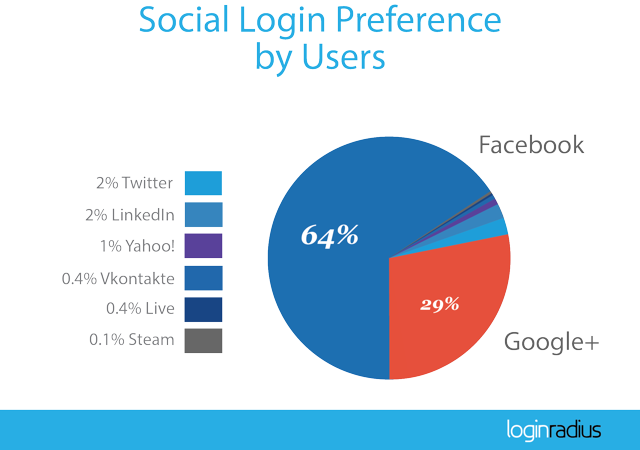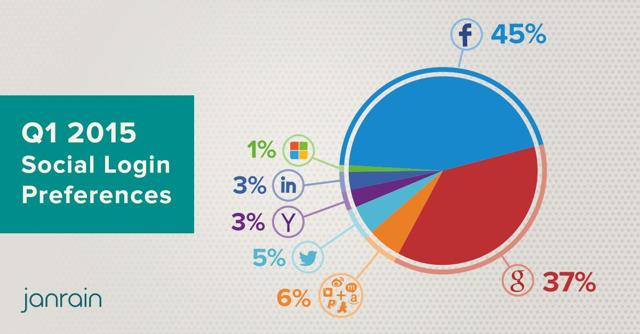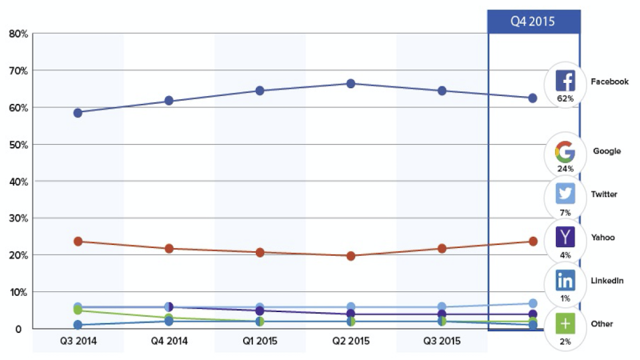Summary
Social logins have grown in popularity as 90% of US Internet users used a social login at least once in 2015, up from 53% in 2012.
Facebook is the runaway leader in terms of social login market share, as 92% of websites prefer to provide Facebook as a social login option.
High traffic platforms such as Netflix, Spotify, Yelp, ESPN and Uber support Facebook as the only social login option.
In many ways, Facebook is becoming the consumer's online identity, as the same "login" is used across multiple platforms that span a variety of purposes.
The bear thesis on Facebook (NASDAQ:FB) seems to rest largely on the argument that FB's cool is quickly disappearing and that the Millennial audience is shifting toward Snapchat (Private:CHAT). We have argued that this has been true for some time, but that it doesn't seem to matter for FB because the social platform has become much more than just social. In today's society, Facebook is a utility. On top of previous arguments we have made, we believe one interesting angle to approach this topic is through social logins.
Have you been greeted with a "Sign Up With Facebook" query when trying to register with a new website or app? If so, you're not alone. This is called the social login, and social logins are becoming quite popular across the Internet due to their convenience and ease of use. As opposed to filling out an entire form, all that is required is a simple click and you're good to go.
According to customer identity management provider Gigya, nearly 90% of US Internet users used a social login at least once in 2015, up from 53% in 2012.
Due to its sheer size, it should be no surprise that Facebook is the runaway leader in terms of social login market share. According to LoginRadius Analytics, which analyzed customer behavior data from over 160,000 websites in Q1 of 2016, Facebook is the preferred social login for 64% of users, while Google (NASDAQ:GOOG) (NASDAQ:GOOGL) stands at 29% and Twitter (NYSE:TWTR) and LinkedIn (NYSE:LNKD) at only 2% each.
Customer-profile management provider Janrain reached a similar conclusionin their 1Q15 report, with Facebook being the preferred option by 45% of social login users. Google sat a second with 37% share and Twitter accounted for 5%.
Meanwhile, Gigya puts Facebook's social login share at 62%. Gigya also found that Facebook's social login share is greater globally, accounting for as much as 83% of all social logins in Central and South America. The firm also found that Facebook's lead in the all important mobile space is just as great, with the platform accounting for 80% of mobile social logins.
Our quick scan across the Internet confirmed LoginRadius, Janrain and Gigya's findings. Nearly every popular website we frequent across a variety of topics supported a Facebook social login. A good number supported a Google login, while a much lesser number supported Twitter, Amazon and Microsoft logins.
All of the following sites support a Facebook social login while some support multiple social logins.
- Music: Spotify, Shazam, Tidal (also has Twitter), Soundcloud (also has Google), iHeartRadio (also has Google), Slacker (also has Google), Vevo(also has Google), NPR Music (also has Google), TuneIn (also has Google), Metro Lyrics (also has Google and Twitter)
- Movie/Video: Netflix, Hulu, Vimeo, Break, Rotten Tomatoes, Fandango(also has Google), Dailymotion (also has Google), Funny or Die (also has Google), IMDb (also has Amazon and Google)
- Games: Miniclip, Zynga (NASDAQ:ZNGA), Addicting Games, Gamespot(also has Twitter and Google)
- Ride-Sharing: Uber, Lyft
- Review/Delivery Services: Postmates, Yelp (NYSE:YELP), Grubhub(NYSE:GRUB), Doordash, OpenTable (also has Google), Zomato (also has Google)
- Sports: ESPN (NYSE:DIS), NBA, MLB, Bleacher Report, NHL (also has Google), Nascar (also has Twitter and Google), Deadspin (also has Twitter and Google)
- Career/Education: Lumosity, Chegg (NYSE:CHGG), Glassdoor (also has Google) Udemy (also has Google), Khan Academy (also has Google),Quizlet (also has Google), edX (also has Google and Microsoft)
Some of the biggest sites in each space like Netflix, ESPN, Spotify, Yelp, Uber, Chegg, and Miniclip support only a Facebook login, while it looks like most websites across the web support at least a Facebook login in addition to some other social login. LoginRadius' numbers confirm this, as they found that 92% of websites prefer providing Facebook as a Social Login option, and that Facebook has been the Internet's favorite social login since 2013.
Interestingly enough, 2013 also is when Snapchat launched Stories and began to ramp its user growth and reportedly steal Facebook's "cool." Essentially, data suggests that in the same year Snapchat began to steal Millennial eyeballs, Facebook pivoted from being a Millennial addiction to a consumer utility.
We have written plenty on how Facebook is much more than a social platform, but our latest research suggests Facebook operates at an even deeper level. Across the Internet, Facebook serves as a consumer identity of sorts. The same Facebook "login" can be used across multiple platforms for a variety of purposes (92% of all websites). We believe this is a powerful concept, that Facebook is how consumers log in to other platforms, and believe it serves to widen Facebook's moat as a utility in today's world.
112,656 people get FB breaking news and analysis by email alert



